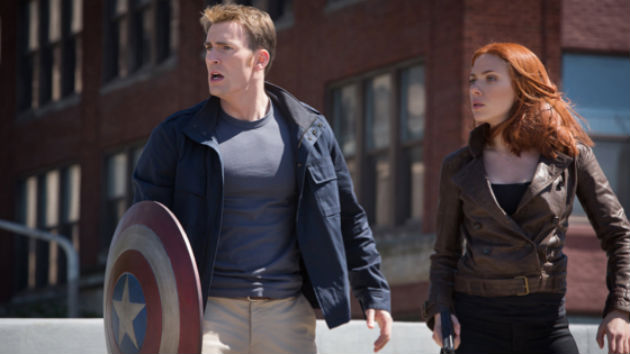This post is a two-part, co-authored post by our own Casey Schmitt and Rebecca Keyel, a student in UW-Madison’s department of Design Studies.
It’s a bird! It’s a plane! It’s a complex allegory for modern American social conditions! Or, maybe, it’s just some dude in a cape.
For years now, with an increasing popular audience for superhero stories, films, and merchandise, audiences have sought to trace literary meanings and social commentary in the content of comic-book escapades. Iron Man is, for many, a not-so-subtle metaphor for the military-industrial complex. Director Christopher Nolan’s Batman epic, The Dark Knight, is widely viewed as a defense of the Bush administration‘s post-9/11 counterterrorism policies. In Barry Brummett’s 2008 collection on “social issues in disguise,” William Earnest traces the “hidden rhetorics” of 20th Century Fox’s X-Men franchise as subtle yet potent commentary on LGBTQ rights and activism. When film reviews for Marvel Studios’ Captain America: The Winter Soldier circulated earlier this year, the film was framed through a political lens, being lauded as a smart and “scathing critique of 21st-century surveillance” by left-leaning outlets and lambasted as “shallow” and “lefty” by right-leaning sources. One favorable reviewer even wrote, “Edward Snowden could be on Winter Soldier‘s marketing payroll. It’s that revolutionary.”
As fans of some of these films and their characters, we found this emphatic turn in public conceptions of the superhero intriguing. Certainly these stories have political overtones and allusions. Even if unintentionally, as mere products of their place and time they might comment on dominant social concerns and conditions. Yet we wondered how prevalent these elements of social commentary actually were in the films. That is, while these so-called “hidden rhetorics” may have critical social qualities, are the films themselves actually as “revolutionary” as some reviewers have claimed? A quick glance at two recent blockbusters provides some perspective.
Captain America: The Winter Soldier
Captain America: The Winter Soldier is tangentially a sequel to Captain America: The First Avenger, part of what Marvel calls Marvel Phase 1, the set of films that led up to the release of Avengers in 2012 and went on to break a number of box office records. Winter Soldier follows the super-heroic Captain America and Black Widow as they discover the intelligence organization they work for—known as S.H.I.E.L.D.—has been compromised by Hydra, a Nazi offshoot originally founded by the fist film’s villainous Red Skull.
Captain America comics have long commented on social issues—in fact, the original stories were published in part to encourage U.S. entry into World War II—and, while their “hidden rhetoric” critiques have not always been nuanced or successful, Winter Soldier follows suit by engaging a number of contemporary political topics, most notably personal agency and privacy.
In the film, S.H.I.E.L.D. has developed a system called Project Insight, which allows the organization to predict and eliminate potential threats to national security. The system is meant to be a preemptive strike against domestic, international, and extraterrestrial attacks. However, Hydra’s leaders are using their control over the United States’ intelligence apparatus to mine the electronic records of everyone living in the U.S., giving them the ability to predict whether or not the individual will be a threat to the organization. This system identifies such potential threats to Hydra and eliminates them, a preventative measure to keep the control over society that Hydra spent the previous fifty years cultivating. Once the film’s protagonists discover this threat, they formulate a plan to thwart it by triggering the weapons system to target itself instead
Within the film’s narrative structure, the implications of this kind of power in the hands of an “evil” organization like Hydra are obvious. The film’s protagonists understand just how dangerous that ability is and must take down the system before Hydra can activate it. The story, for many viewers, echoed public concerns about NSA surveillance, drone strikes, and the potential for U.S. government agencies to infringe on citizen privacy in the name of security, law, and order.
The more subtle commentary of the film concerns the choices an individual makes, and the film engages with these issues on multiple levels with multiple characters. While Winter Soldier isn’t the first film to engage with issues of surveillance and “big brother,” or even the first superhero film to use surveillance as a plot point, it takes a particular stance against using surveillance on an unsuspecting population. The crux of the film’s plot is the threat to the U.S. population and the fact that an individual’s electronic records were what made them targets for assassination. The individual choice to commit or not to commit a threatening act was circumvented by the potential threat they represented.
The choice to act or not and the absence of choice is what makes the film’s “villain” and eponymous character—the brainwashed assassin known as Winter Solider—ultimately sympathetic. Hydra and its scientists remove his sense of identity and his agency. He is prevented from making any choices of his own and is actively turned into a threat to others. In contrast, in the film’s climax, the Black Widow character actively chooses to give up her privacy and the secrecy of S.H.I.E.L.D.’s files by uploading them to the Internet, a la Wikileaks. However, in releasing her secrets, she also releases sensitive government information to the wider public, potentially compromising national security. She’s allowed that choice, but she takes the choice away from those others who are potentially impacted by her actions.
In a film like Winter Soldier, thus, superhero exploits seem to mimic popular sentiments and champion a social cause, but in sometimes muddy, inexact terms. In part two of this post, we consider another superhero film to demonstrate that the social activism of the superhero movie is not always as potent as it may at first seem.
See Part II for conclusion.



